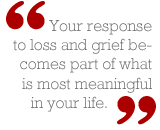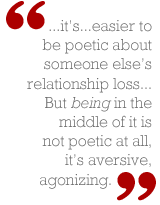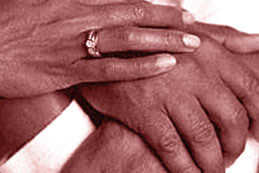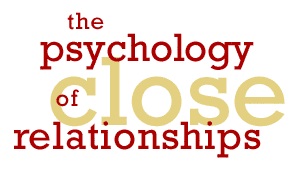








|
Why We Risk Love…and Loss
At the outset of the course, I suggested we'd follow the "life cycle" of relationships, beginning with the motives and initiations of friendships and romance; moving on to how relationships are conducted and
how they develop; and finally concluding with how relationships end, whether through death, divorce or a breakup. When our course began, I anticipated that this last lesson would examine some of the highs as well as the lows, the "grand
passions" we enjoy just because we put ourselves at risk for loss. After all, without love, loss has no pain. It is possible to avoid heartbreak, but only by not giving your heart in the first place. For most of us,
that numbness would be an impossible choice. We may sometimes think wishfully of a risk-free and intimacy-free life, but would most of us choose it? Nah, you and I may wince at the thought, but we choose the pain.
In the 1992 movie "Shadowlands" (based on William Nicholson's play), Anthony Hopkins plays the writer, C. S. Lewis, who discovered love late in life, only to lose his wife Joy (Debra Winger) to cancer four years after they
married. In a lovely if fictional vacation to the Lake Country, Lewis gives in to an outburst about the unfairness of the pain to come, given how happy they are now. His wise, dying wife enlightens him: "Don't you see? The pain then is
part of the happiness now."
Would you enjoy love if you could never lose? If a competition were easy, winning would mean less. If intimacy were risk-free, what would it mean to get "close" to someone? We'd all be getting "close" all the time, no harm, no
foul. In 1969's Love and Will, the late existential psychologist Rollo May speculated that, if we were not mortal, we would not make love. Our ability to experience ecstasy, he noted, depends on our knowledge that our lives are finite,
and our time is precious. Our feelings are defined by how we choose to spend our time, and with whom.
Grief From the Outside and Inside
The pain of loss is proof that you've risked love. Your response to loss and grief becomes part of what is most meaningful in your life. There are many types of loss, many qualities of grief, and bereavement is
surely unique for every bereft individual. But research has shown that whatever the source of loss, there are commonalities in our psychological responses. Whether the relationship loss is caused by divorce or death of one's
partner, a formal separation or an unspoken breakup, whether it is sudden or gradual, our ideas and feelings have much in common. In this lesson, we'll examine the meanings, origins, stages and tasks of relationship loss and grief. Be
prepared to reflect, remember sadness, but also to feel relieved and maybe have a good laugh as you consider the nature of endings and heartbreak.
The Damn Platitudes
Years ago, I taught an Elderhostel class, a noncredit course for older adults. The subject was loss and grief, something my students had lived long enough to experience plentifully. I devoted one class to an
open discussion about what people most disliked about the rituals of grief: masses and memorials, obituaries and eulogies, wakes and funerals, gravestones and sympathy cards. Each example offered provoked more laughter or anger:
"The expense!" "Sympathy from people you don't know," "Statues of angels!" and so on. But the capper, which received the most applause, came when one gentleman, whose middle-aged daughter was dying of cancer, offered the most familiar
irritation: "The damn platitudes!"
When I suggest that loss and grief offer identity and meaning, I'm not just offering you platitudes. These experiences -- giving, risking, suffering and losing -- are real psychological processes, analyzed and validated by
research. The less you invest in a relationship, the less you lose. Get close to people, and your emotional connection means that you will "feel their pain!" But protect yourself, maintain some distance, and problems will cause only a
ripple. When you are on the outside of grief, not suffering from emptiness or trauma yourself, it's a little easier to be poetic about someone else's relationship loss: it's "noble," "self-sacrificing," "honorable" to endure heartbreak.
But being in the middle of it is not poetic at all, it's aversive, agonizing.
This difference in perspective might explain why, when you grieve, you struggle to retain your composure, while sympathetic outsiders retreat into platitudes. When you have suffered the loss, you are "inside" the grief, where it
really hurts, and where scripts are hard to find and harder to follow. When you are a sympathetic outsider, you can retreat into a ritual: attend the service, sign the guest book, deliver a pie or casserole to the bereft family -- and
recite the platitudes.
The word "platitude" -- a trite phrase of advice or sympathy -- comes from a Greek root meaning "flat" or "broad." Platitudes such as "It's all for the best" or "She's in a better place now" or even "I know just how you feel"
are so broad and abstract, they distance and diminish the listener. But then, what should you say to someone who suffers a loss? Researchers to the rescue: A study of the best and worst words of consolation shows that the most
helpful (and genuine) thing to say to a grieving individual is simply "I'm so sorry." (For other suggestions about how to respond to others' grief, see Recommended Books at the conclusion of this lesson).

|



